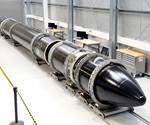Rocket Lab launches 7 payloads into orbit
The mission, named “It’s Business Time,” marks Rocket Lab’s second successful orbital launch of its all-composite Electron launch vehicle.
Rocket Lab (Aukland, New Zealand) launched seven payloads to orbit on Nov. 11. The mission, named “It’s Business Time,” marks Rocket Lab’s second successful orbital launch of its all-composite Electron launch vehicle and deployment of customer satellites.
Satellites were deployed for Spire Global (San Francisco, CA, US), Tyvak Nano-Satellite Systems (Irvine, CA, US), Fleet Space Technologies (Beverly, Australia) and the Irvine CubeSat Stem Program (ICSP, Irvine, CA, US). Curie also carried NABEO, a drag sail technology demonstrator, designed and built by High Performance Space Structure Systems GmbH (Munich, Germany), to passively de-orbit inactive small satellites and reduce space junk.
Rocket Lab founder and chief executive Peter Beck says the mission marks a new era in access to space. “With two orbital launches down for 2018, we’re not resting on our laurels,” says Beck. “We have a burgeoning customer manifest, so we’re moving onto the next mission within a few weeks – the incredibly exciting ELaNa 19 mission for NASA in December.”
Rocket Lab is poised for high-frequency launches in 2019 with production facilities designed to enable mass Electron production, and a private launch complex licensed to launch up to 120 times per year.
Related Content
-
Plant tour: Teijin Carbon America Inc., Greenwood, S.C., U.S.
In 2018, Teijin broke ground on a facility that is reportedly the largest capacity carbon fiber line currently in existence. The line has been fully functional for nearly two years and has plenty of room for expansion.
-
Low-cost, efficient CFRP anisogrid lattice structures
CIRA uses patented parallel winding, dry fiber, silicone tooling and resin infusion to cut labor for lightweight, heavily loaded space applications.
-
Composites end markets: New space (2025)
Composite materials — with their unmatched strength-to-weight ratio, durability in extreme environments and design versatility — are at the heart of innovations in satellites, propulsion systems and lunar exploration vehicles, propelling the space economy toward a $1.8 trillion future.



